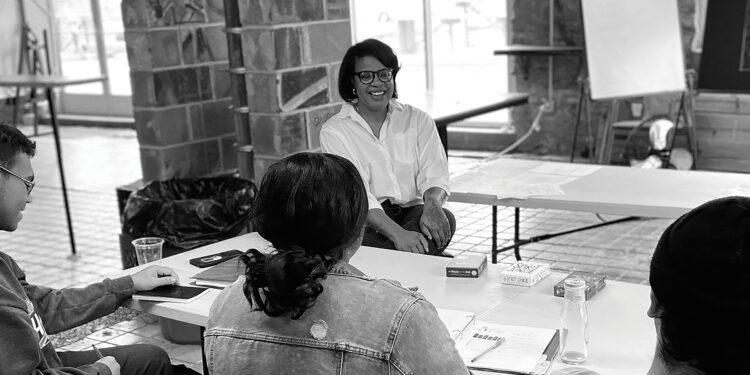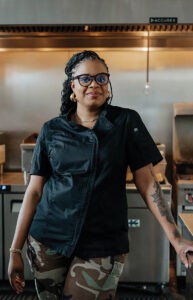Teaming Up to Break the Cycle

Story by Dave Eckert
Teamwork is a term most associated with sports, but for NourishKC and The Prospect KC, two local non-profit organizations, teamwork means working together to tackle food insecurities in Kansas City, while at the same time, providing underserved communities with a variety of culinary opportunities. The union will combine NourishKC’s meal programs with The Prospect KC’s nutritional education initiatives. The Prospect KC’s founder, Shanita McAfee-Bryant calls the partnership a game changer. “We’re not just addressing immediate hunger; we’re working to break the cycle of food insecurity. Together, we can provide more than meals—we can offer people the skills and knowledge they need to build a stable, self-sufficient future.

Shanita McAfee-Bryant
For the community, it means expanded food rescue, nutritional education, and real career opportunities. It’s about holistic, lasting change,” McAfee-Bryant shared. “It feels like a natural evolution of our work. NourishKC has been doing incredible food rescue and meal distribution for over 35 years, and since we started The Prospect KC in 2019, we’ve been focused on culinary workforce development. We quickly realized how much stronger we could be by combining forces. NourishKC brings the expertise of getting food to people in need, and The Prospect KC adds education and job training to create long-term solutions.”
McAfee-Bryant says the mission of The Prospect KC is simple-create opportunities for people through food. “But our vision goes deeper than that. We want to help individuals find jobs and build careers that lead to long-term stability. I started The Prospect because I saw the need for actual workforce development in the food industry, especially for people in underserved communities. People are often interested in culinary work but don’t have access to training programs or pathways into the industry,” McAfee-Bryant said. “Since we began, we’ve been training individuals through our culinary job programs, including hands-on learning at our café, The Nook, inside the Kansas City Library. It’s not only about cooking—it’s equipping people with the tools they need to create a better future for themselves. We aim to continue growing, offering more training opportunities, and ultimately empowering more people to take control of their lives through meaningful employment in the culinary field,” McAfee-Bryant stated.
McAfee-Bryant has worked in the culinary and hospitality industries for over 20 years, but she says her journey started as a child. “Growing up, I saw how food, or the lack of it, impacted people around me, and I knew I wanted to do something meaningful with my skills. After working in kitchens across the country, I realized that food could be more than just a job for me—it could be a tool for change. That’s why I founded The Prospect KC,” McAfee-Bryant told me. “I wanted to use my love for food to help others, especially those who have been left out of the opportunities that the culinary industry can provide. For me, The Prospect is a way to give back to my community while creating opportunities for others to build sustainable careers. It’s not just about what’s on the plate—it’s about what that plate can do for someone’s future.”
The inner city is often referred to as a food desert, but McAfee-Bryant says a more accurate term is food apartheid. “The lack of access to healthy, affordable food isn’t occurring naturally. It’s the result of systemic inequalities. Food apartheid highlights how race and economic status play a role in who has access to nutritious food and who doesn’t. It’s not just about the absence of grocery stores; it’s about the larger structures that keep healthy food out of reach for specific communities. People often rely on convenience stores or fast food in these areas, which provide limited healthy options. This leads to long-term health problems like diabetes, heart disease, and obesity. Add factors like low wages and lack of transportation, and the situation becomes more significant than just food—a systemic issue impacting people’s overall well-being. This is why, at The Prospect KC, we don’t just focus on providing food. We provide education and job training to help break these cycles and create sustainable change,” McAfee-Bryant said.
McAfee-Bryant says the partnership with NourishKC will help, but it’s only one step, not a panacea. “Access to fresh, healthy food is crucial for the community’s overall health because it directly impacts physical well-being, mental health, and economic stability. The Prospect KC team and I work tirelessly to address food apartheid on Kansas City’s East Side by providing nutritious meals and nutrition literacy programs. Unlike processed alternatives, fresh foods are rich in essential nutrients, vitamins, and minerals that help prevent chronic diseases like obesity, diabetes, and heart disease. Furthermore, healthy food access supports mental health, as nutrient-dense diets are linked to better cognitive function and reduced anxiety and depression. The Prospect KC fosters a cycle of improved health, economic mobility, and community resilience by empowering individuals with the knowledge and access to fresh ingredients,” McAfee-Bryant stated.
Look for the NourishKC and The Prospect KC’s efforts to roll out in the coming months and for joint initiatives to begin immediately. To lean more or to get personally involved, visit www.theprospectkc.org.






